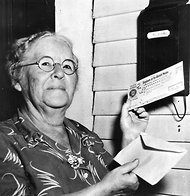 Social Security AdministrationIda May Fuller, the first Social Security beneficiary to receive a recurring monthly payment (beginning Jan. 31, 1940).
Social Security AdministrationIda May Fuller, the first Social Security beneficiary to receive a recurring monthly payment (beginning Jan. 31, 1940).
Consumer groups — along with paper-producing interests – -are urging the federal government to improve safeguards for Social Security recipients, as the government phases out paper checks for beneficiaries in favor of electronic deposits.
Beginning in March, all Social Security checks will be deposited electronically unless recipients apply for and receive a waiver to keep getting payments via paper checks.
Recipients must receive the payments by direct deposit to a bank account, or to a debit card, including the government’s DirectExpress card. The debit cards allow beneficiaries to make retail purchases with the card or withdraw the funds from automatic teller machines. If current recipients don’t choose a deposit option by March 1, they’ll automatically be sent a DirectExpress card to avoid any delay in receipt of benefits, the Social Security Administration says.
The move is part of an continuing effort by the federal government to reduce paper and cut costs by going electronic for all sorts of things, including savings bonds, unemployment benefits and Social Security benefit statements. Already, 94 percent of beneficiaries receive payments electronically, according to the Office of Inspector General for the Social Security Administration.
But in testimony before a congressional committee this month, consumer advocates urged the government to make sure that safeguards are in place to prevent fraud, like re-directing recipients’ electronic payments, and that the waiver process for recipients who do not want electronic deposits is clear and straightforward.
Beneficiaries aged 92 and older are exempt from the electronic deposit requirement, and others who still want to get paper checks can apply for a waiver. But according to testimony from the National Consumer Law Center, the waiver process is so difficult that few waivers actually have been granted. The group urges the government to liberalize the waiver process, so people who are more comfortable getting paper checks may continue to do so.
While the vast majority of recipients already have voluntarily switched to electronic deposit, “the
population that has resisted doing so to date generally has a good reason,” according to testimony from Margot Freeman Saunders, a lawyer with the consumer law center. They include people who don’t have a bank account; those who don’t understand or feel comfortable with direct deposit; and people who already have workable and affordable methods of receiving their benefits.
Of the over 72,000 calls received by Treasury between May 1, 2011 and July 30, 2012 regarding a waiver, only about 14,000 were even sent a waiver packet with instructions, she said. Then, only 281 notarized responses were received back by Treasury. Those numbers, Ms. Freeman Saunders said, are a “clear illustration” that the need for the waiver far exceeds the number of people actually obtaining one.
Fraud is another concern. The Inspector General of the Social Security Administration said in testimony to Congress this month that it has received more than 19,000 reports about questionable or unauthorized changes to recipients’ direct-deposit information, apparently as part of efforts to illegally re-direct monthly payments. “These reports have involved either an unauthorized change to direct deposit information, or a suspected attempt to make such a change,” according to testimony by Patrick P. O’Carroll Jr., the inspector general for the SSA.
The Inspector General has recommended Social Security make changes to prevent fraudulent redirection of deposits, like developing an automatic notification system to alert recipients of any changes to their deposit information.
On a less dramatic level, consumer groups caution that debit cards may pose challenges for some senior citizens, who may not be used to using PINs and many not know how to properly safeguard them. The cards also carry fees that seniors may be unaccustomed to paying. Fees under DirectExpress are relatively limited; the card offers one free A.T.M. withdrawal after the funds are deposited, and subsequent withdrawals carry a 90-cent fee. Fees also apply for receiving a monthly paper statement (75 cents) and for transferring funds to a personal bank account ($1.50).
A new advocacy group, Consumers for Paper Options, argues that the move will present a hardship for many elderly check recipients. The group has asked the government to retain paper checks as the default option, with electronic delivery available if requested by recipients.
“We think people ought to have a choice for important financial information,” said John Runyan, executive director of Consumers for Paper Options. He said the non-profit is primarily backed by “paper-based communication interests,” like the Envelope Manufacturers Association, the American Forest Paper Association and various paper companies.
Do you or your relatives receive a paper Social Security check? Are you concerned about the move to electronic payments?
Article source: http://bucks.blogs.nytimes.com/2012/09/24/safeguarding-social-security-checks-as-they-go-electronic/?partner=rss&emc=rss